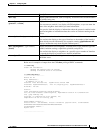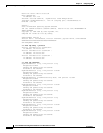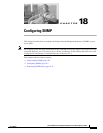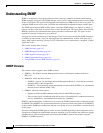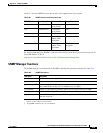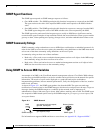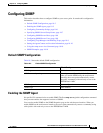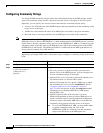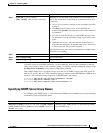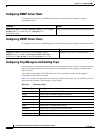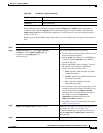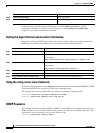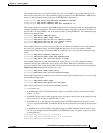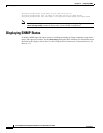
18-5
Cisco IOS Software Configuration Guide for Cisco Aironet Access Points
OL-11350-01
Chapter 18 Configuring SNMP
Configuring SNMP
Configuring SNMP
This section describes how to configure SNMP on your access point. It contains this configuration
information:
• Default SNMP Configuration, page 18-5
• Enabling the SNMP Agent, page 18-5
• Configuring Community Strings, page 18-6
• Specifying SNMP-Server Group Names, page 18-7
• Configuring SNMP-Server Hosts, page 18-8
• Configuring SNMP-Server Users, page 18-8
• Configuring Trap Managers and Enabling Traps, page 18-8
• Setting the Agent Contact and Location Information, page 18-10
• Using the snmp-server view Command, page 18-10
• SNMP Examples, page 18-10
Default SNMP Configuration
Table 18-3 shows the default SNMP configuration.
Enabling the SNMP Agent
No specific CLI command exists to enable SNMP. The first snmp-server global configuration command
that you enter enables the supported versions of SNMP.
You can also enable SNMP on the SNMP Properties page on the web-browser interface. When you
enable SNMP on the web-browser interface, the access point automatically creates a community string
called public with read-only access to the IEEE802dot11 MIB.
Table 18-3 Default SNMP Configuration
Feature Default Setting
SNMP agent Disabled
SNMP community strings No strings are configured by default. However,
when you enable SNMP using the web-browser
interface, the access point automatically creates
the public community with read-only access to the
IEEE802dot11 MIB.
SNMP trap receiver None configured
SNMP traps None enabled



